Postpublished at 21:00 BST 1 May 2015
Pippa Bartolotti seems to be speaking more quietly than in the ITV debate - the message hasn't changed, but she is delivering it in a way that is probably better-suited to a televised debate.
The Wales Report's Huw Edwards chaired a live debate from Cardiff's Sherman Theatre
The panel represented all six main parties standing in Wales - covering topics including the economy and the NHS
George Herd and Tomos Livingstone
Pippa Bartolotti seems to be speaking more quietly than in the ITV debate - the message hasn't changed, but she is delivering it in a way that is probably better-suited to a televised debate.
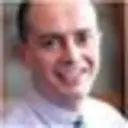 Prof Roger Scully
Prof Roger Scully
Cardiff University
Kirsty Williams also defending the coalition's economic agenda - but then putting the Lib-Dem spin on it by indicating that future cuts from her party would be much less than from the Tories.
 Prof Roger Scully
Prof Roger Scully
Cardiff University
There's certainly no meeting of minds on the economic agenda here - either among the panellists or the audience!
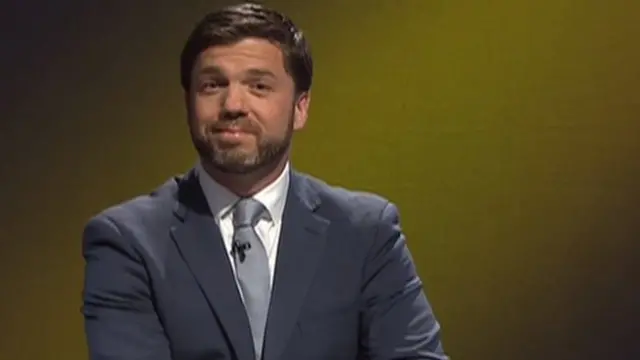
Stephen Crabb tells his opposite number Owen Smith that Labour would "drag us back" on the economy
Audience member tells Owen Smith he has genuine concerns over Labour's handling of the economy - prompts the first argument of the night, predictably between Stephen Crabb and Mr Smith.
Bartolotti: Austerity doesn't work. It's time to invest in people.
 Prof Roger Scully
Prof Roger Scully
Cardiff University
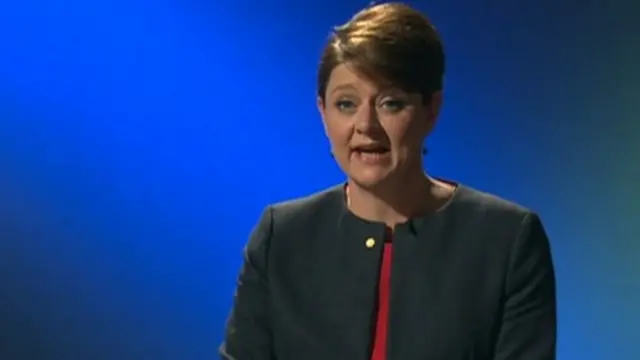
Leanne Wood drawing quite effectively there on the caustic criticism of the austerity by Nobel-prize winning economist Paul Krugman.
 Prof Roger Scully
Prof Roger Scully
Cardiff University
Stephen Crabb with a determined defence of the Tories' economic record there, reinforcing the emphasis he placed on the subject in his opening statement.
 Prof Roger Scully
Prof Roger Scully
Cardiff University
Owen Smith putting forward, perhaps, a more confident exposition of the Labour economic approach than Ed Miliband managed last night.
Stephen Crabb says that Wales has seen some of the fastest growth rates because the government has been taking the issues head-on. We need some cuts, says Owen Smith, but says we need to get rid of the "curse" of zero-hours contracts, and to ask those with "broader shoulders to bear a bigger burden".
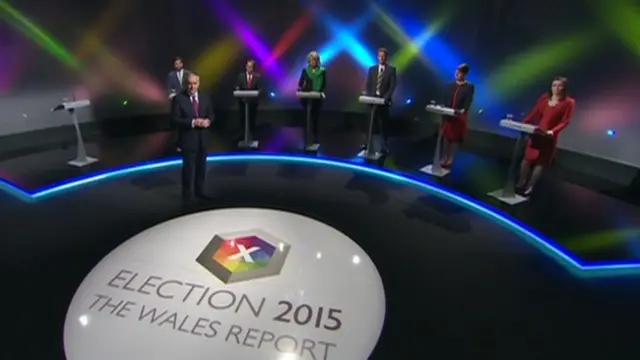
The view from the audience of the panel and Huw Edwards at the Sherman Theatre
First question is on the economy - how can politicians promise austerity and economic growth at the same time?
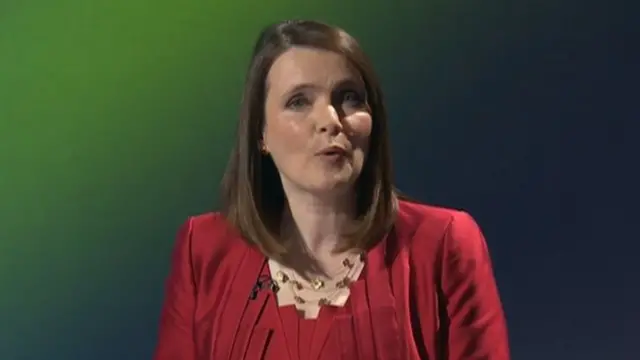
Kirsty Williams opened the debate
Kirsty Williams opening the debate
We're into the opening statements - Kirsty Williams sticks to the 'stronger economy and fairer society' message; Leanne Wood says Wales has been noticed as never before in this General Election. UKIP's Nathan Gill urges voters to read the party's manifesto.
 Prof Roger Scully
Prof Roger Scully
Cardiff University
Already getting involved on Twitter - our resident expert @roger scully, external had this to say, external: "I thought all the participants did well in the ITV debate - but plenty disagreed with me on that! How will they do tonight? #WalesDebates
A word on the format - each of the participants will make a short opening statement of around 45 seconds each. Then it's over to questions from the audience - which the politicians haven't seen in advance.
And we're off - Huw Edwards is introducing the Wales Report Election 2015 debate -live from the Sherman Theatre in Cardiff
Remember - you can get involved in the debate tonight on social media - follow the tag: #walesdebates
 Prof Roger Scully
Prof Roger Scully
Cardiff University
In these debates, as in campaigns as a whole, politicians have two jobs. First, they need to reinforce the support they already have, particularly among those weaker supporters who might be wavering.
Second, they have to try and appeal to floating voters, and wavering supporters of the other parties. In this closest and most unpredictable of elections, the debate offers a last major chance for these leading figures in all the main parties to accomplish those two tasks.
For Stephen Crabb, he has to try and drive home the Conservative Party's key messages: on the economy and on leadership, which are areas where the poll suggest the Tories enjoy important advantages. He will also want to draw back to the Tories some right-of-centre voters who have been considering UKIP.
Owen Smith may have one piece of common ground with Crabb - in emphasising that the election will ultimately result in a Conservative or a Labour Prime Minister. But he will also want to highlight Labour's strengths - even though one area in which the polls show Labour to be strongest, the NHS, is a devolved issue in Wales.
Leanne Wood's profile has been boosted greatly by the campaign. She will want to hammer home what have been her party's key messages: on parity of funding for Wales with Scotland, and the idea that Plaid will be the party that will most determinedly fight Wales's corner.
Kirsty Williams has a similar task as did Nick Clegg last night - as a very capable public performer trying to get over a Lib-Dem message to a public that currently seem reluctant to listen. Her party continue to focus on the moderation they believe they could provide to either a Conservative- or Labour-led government.
For both UKIP's Nathan Gill and Pippa Bartolotti, their relative inexperience in such debates is both a potential danger and an opportunity. In the ITV Welsh debate both at times seemed less polished than their opponents. But perhaps that does them no great harm. Both want, albeit from very different standpoints, to convince people that they offer something very different from the established parties, and provide fresh political alternatives.
Joining us throughout tonight's proceedings will be Prof Roger Scully, from Cardiff University's Wales Governance Centre.
He'll be offering us some expert insight into the debate - and whether anyone has landed a political punch.